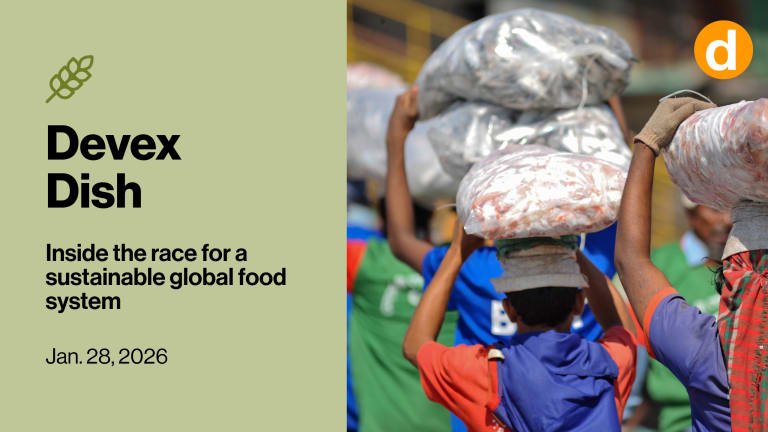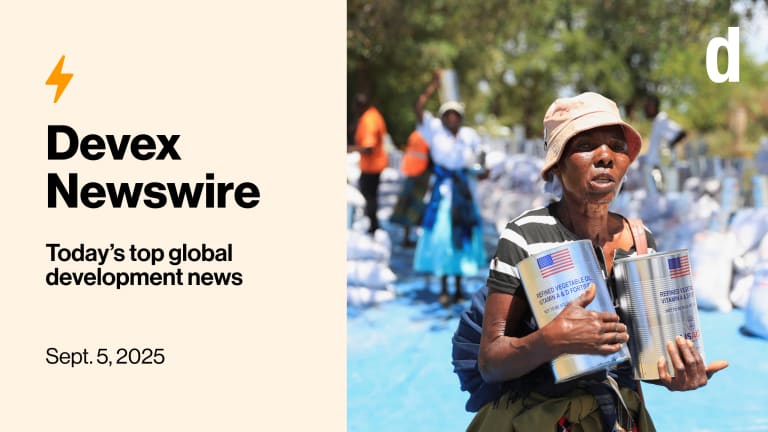
The former United Nations relief chief pulls back the curtain on why it took so long for the U.N. Security Council to hold a meeting about potential famine in Ethiopia’s Tigray region.
In today’s edition: We are also reporting on an alarming moment in history for global drought, and asking if tech innovators can help soften the blow of the food crisis in Kenya.
This is a preview of Newswire
Sign up to this newsletter for an inside look at the biggest stories in global development, in your inbox daily.
A U.N. famine declaration is not a warning that things could get bad — it is a confirmation that they are already really bad.
A famine is “the absolute inaccessibility of food to an entire population or sub-group of a population, potentially causing death in the short term,” according to IPC, the body that classifies food security phases. For humanitarians that means waiting until a famine is declared to raise alarms and marshal international support is already much too late.
That’s one reason former U.N. Emergency Relief Coordinator Mark Lowcock’s inside account — shared with my colleague William Worley — of the delay tactics used to stifle high-level discussion of Ethiopia’s food security crisis is so alarming.
“For months and months and months” the Security Council faced delays in getting open meetings to discuss the deteriorating situation in Tigray, and Lowcock says that was the result of “effective diplomatic maneuvers in New York” by Russia and China — the Ethiopian government’s allies.
“The delay cost lives and added to suffering, especially among women and children,” Lowcock says.
Taye Atske Selassie, the Ethiopian ambassador and permanent representative of Ethiopia to the U.N., denied Lowcock’s claims. Russian and Chinese permanent missions to the U.N. did not respond to a request for comment.
But Lowcock says the Ethiopian government was using food as a weapon of war.
“The Ethiopians basically wanted to starve the Tigrayans into submission or out of existence … That was objective one, but objective two was to do that without attracting the global opprobrium that is associated with deliberately causing a famine taking hundreds of thousands or millions of lives,” he says.
Exclusive: Russia, China foiled UN meetings on Tigray famine, says Lowcock
+ Sign up to Devex Dish, a free, must-read Wednesday newsletter, to keep up to date with the race to remake a more equitable and sustainable global food system.
Farm hacks
Catherine Kamanu is a young farmer from central Kenya — and a social media influencer who posts videos of low-tech agriculture solutions to her 28,000 followers.
“I take visuals of myself preparing compost manure which I later apply in my farm. I then post these visuals on my social media platforms and farmers can pick the demonstrations from there,” Kamanu says.
David Njagi reports for Devex that with maize and wheat prices doubling in Kenya due to inflation and supply chain problems, innovators at both the individual and institutional levels are looking for ways technology can help ease the strain.
Read: Kenyan innovators turn to smart farming as food crisis worsens (Pro)
+ A Devex Pro subscription brings you essential analysis, data-driven funding insights, and access to the world’s largest global development job board. Get these perks and more by signing up to our 15-day free trial.
High and dry
The World Health Organization has classified the drought in the Horn of Africa as a grade three health emergency — the agency’s highest crisis ranking. This is the first time in the history of the WHO emergencies program and this grading system where a drought and food insecurity crisis have reached this level of emergency, Sara Jerving reports.
Read: Drought reaches top WHO health emergency status for the first time
Stuck in the mud
If we don’t better manage and restore wetlands, the lives and livelihoods of the most vulnerable people will come under increasing threat.
— Jane Madgwick, CEO, Wetlands InternationalThe Convention on Biological Diversity’s 15th meeting of the Conference of the Parties is underway in Nairobi, with representatives looking to strengthen the post-2020 Global Biodiversity Framework. But in an op-ed for Devex, Madgwick writes that wetlands, on which over 1 billion people globally rely, are “absent — or at best only glancingly represented” in the target setting process.
Opinion: Global wetlands targets are essential to a livable future
In other news
The U.N. biodiversity summit, already postponed earlier this year due to COVID-19, will now move its venue from China to Canada. [AP]
The World Bank greenlit yesterday a $2.3 billion program to help eastern and southern African countries deal with food system shocks. [Bloomberg]
At least 300 people died and hundreds injured following a strong earthquake in Afghanistan. [BBC]








